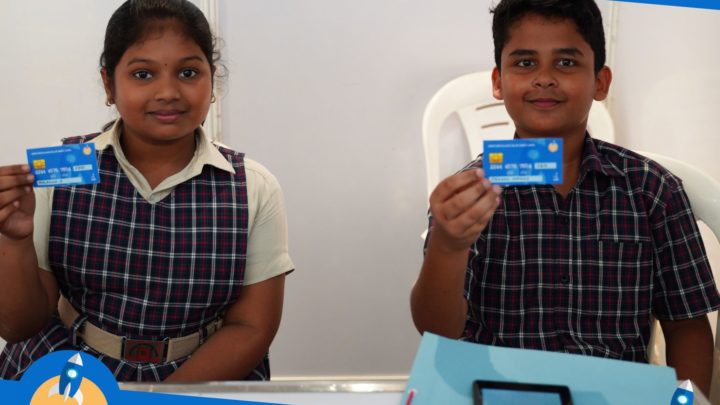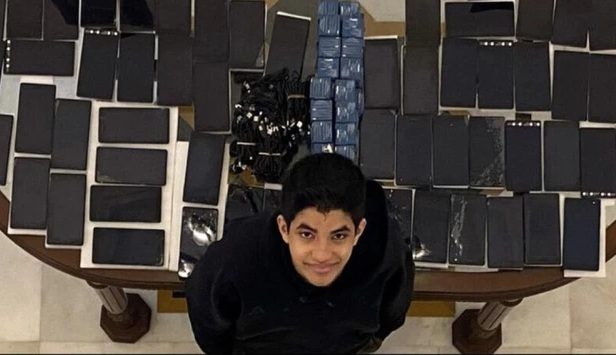(August 10, 2021; 6.30 pm) That learning will increasingly go digital is a given. Especially, in light of the pandemic that has brought the world to its knees and shut schools and colleges across the globe. 2020, touted to be the year of edtech startups, saw several enterprises step in to provide solutions for a smooth takeover of virtual classrooms. However, there was one glaring gap that couldn’t be bridged — what of rural India with its digital divide? That is when entrepreneur Pankaj Agarwal decided to introduce an app Class Saathi through his startup TagHive. The app works equally well in classrooms with and without computers. The solution does not require internet or electricity to work; only a smartphone for the teacher.
The service uses a clicker solution that works alongside a mobile phone app which works well even in the offline mode – making internet connectivity issues redundant. In fact, one of Agarwal’s key focus areas has been to create solutions that will help reduce the dropout rates in India’s schools. His work, got him noticed and the 38-year-old was featured in Fortune’s 40 Under 40 list this year.
#Fortune40Under40
IITK alumnus, Mr. Pankaj Agarwal, gets featured in Fortune India 40 Under 40, 2021. He is the Founder and CEO @taghive Inc. Founded in 2017, TagHive is a Samsung-funded #education #technology company with headquarters in South Korea and India. pic.twitter.com/5v6OI1DICo— Prof. Amey Karkare (DoRA, IIT Kanpur) (@DoRA_IITK) June 3, 2021
Agarwal’s mission has been to reduce dropout rates in schools. In an interview with The Week, he said,
“The dropout rates widen as we go from grade 1 to grade 8. Our focus is to reduce the gap in the early stage.”
According to Agarwal, a leading reason for the high dropout rates in India’s government schools is the learning gap that widens as the grade progresses. Class Saathi offers teachers special features to identify and reduce these gaps.
Journey to the top
According to his LinkedIn page, Agarwal knows the value of good education.
“I come from a small village in India which had no good schools. From there, I went on to study in the best of schools across 3 countries. That led me to believe that education is a great equalizer in life and that technology can help improve the quality of education,” he says.
Agarwal did his B.Tech in Electronics and Electrical Engineering from IIT-Kanpur before moving to Seoul for his Masters at Seoul National University as a Samsung GSP Scholar. Upon his graduation, he joined Samsung Electronics in South Korea and worked there for over three years.
His thirst for knowledge though drove him to aspire higher. In 2010, Agarwal became the first international employee to be sponsored by Samsung for an overseas MBA and studied at Harvard Business School. This was followed by four more years at Samsung in South Korea: first as advisor to the CTO and then as Creative Leader at Tag+.

Pankaj Agarwal
Entrepreneurial journey
All along though, Agarwal knew he wanted to do something to give back to his country; especially in the education space. So, in April 2017 he quit his cushy job to dive headlong into entrepreneurship and founded TagHive, a South Korea-headquartered company that was seed funded by Samsung Ventures. Under TagHive, Agarwal launched Class Saathi, a learning solution tailor made for India. Requiring no electricity, internet connectivity, low maintenance and low cost, it is perfect for classrooms across the country; especially in rural India where the digital divide is a glaring chasm of uncertainty.
Based on the concept of quizzes, Class Saathi provides students with clickers which connect via Bluetooth with the teacher’s smartphone. The startup also ran a pilot project in Uttar Pradesh which found that attendance and learning outcomes of students had gone up significantly within a month. This led the UP government to invite TagHive to deploy its solutions across 200 schools, followed by a project for the Madhya Pradesh government covering 2,000 schools. Agarwal told The Week,
“Class Saathi is a lens that lets us now see things that were not possible earlier. It gives schools and governments tangible data to evaluate and assess the educational system.”
When the pandemic struck last year and schools across the country were forced to shut down, Class Saathi began to focus on its at-home learning app with content for Math and Science tailored for classes VI-X based on the NCERT syllabus. The self-learning app can be used by students at home for self-evaluation and to gauge the learning process.
According to data by UNESCO, 1.2 billion children are out of school globally due to the pandemic and the unprecedented toll it has been taking on our education system. This is where an edtech solution such as Class Saathi steps in to ensure that students continue to be able to access education and Agarwal’s unique perspective has been helping the startup offer India unique solutions.
Also Read: Beyond Classrooms: SpaceBasic CEO Madhavi Shankar helps make campus life easy


